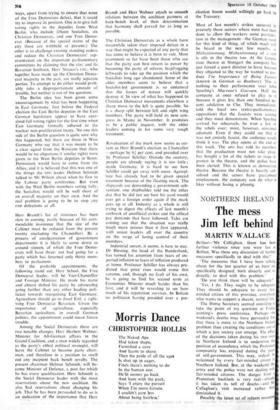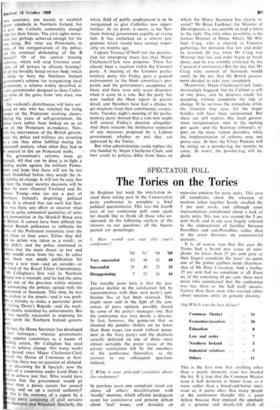NORTHERN IRELAND
The mess Jim left behind
MARTIN WALLACE
Belfast—`Mr Callaghan, there has been further violence since you were last in Belfast. Was there any discussion of further measures specifically to deal with this?'
'The measures that I have been talking about for the last quarter of an hour are specifically designed, both directly and in directly, to deal with this problem.'
`Do you think these will be adequate?'
'Yes, I do. They ought to be adequate. They should be adequate to every fair- minded citizen of this province, everybody who wants to support a decent, normal life.'
The Home Secretary seemed unwilling to take the point of my question at Friday evening's press conference. Perhaps the weekend's deaths may have persuaded him that there is more to the Northern Ireland problem than creating the conditions out of which a just society can emerge. The effect of the decisions taken during his two visits to Northern Ireland is to undermine the position of ascendancy which the Protestant community has enjoyed during the years of self-government. This may, indeed. be welcomed by every fair-minded citizen in Northern Ireland. But, at the weekend, the army and the police were not dealing with fair-minded citizens. The danger from 3 Protestant backlash is very real—already it has taken its toll of deaths—and Mr Callaghan's visit increased rather than diminished it.
Possibly the latest set.of reform measures
ere necessary, not merely to establish decent standards in Northern Ireland, but to give the Catholic community enough hope for their future. The civil rights move- ment has perhaps achieved enough for the time being. But what are Protestants to make of the reorganisation of the police, and the eventual disbanding of, the B Specials? Or of the central housing authority, which will strip Unionist coun- cillors of all powers to allocate housing? Or of the broadly based review body which , likely to bury the Northern Ireland overnment's scheme for reorganising local ;:o‘ernment, a scheme widely described as a new gerrymander designed to deny Catho- lics some of the gains from 'one man, one ote?
The weekend's disturbances will have sur- prised no one who has watched the rising temper of the Protestant working classes. During the years of self-government, the police have rather been looked on as an arm of the Protestant ascendancy. Now, pith the intervention of the British govern- ent, the police and military are reverting o a role they often fulfilled during the neteenth century, when often they had to ordered to fire on Protestant mobs. ,.1. The government's reforms must go hrough. All that can be done is to fight a olding action against the militant Protes- ants, and hope that there will not be too uch bloodshed before they accept the in- vitability of change. It will not be easy, but t least the major security decisions will be aken by men—General Freeland and Sir rthur Young—who are not a part of 'orthern Ireland's dispiriting political cone. It is absurd that not until last Sun- ay was there any effort to uncover what ust be quite substantial quantities of arms d ammunition in the Shankill Road area Belfast. It cannot have been difficult for pecial Branch policemen to infiltrate the nks of the Protestant extremists over the ast three or four years. Either they did, d no action was taken as a result ; or ey didn't, and the police continued to lieve that the main threat to law ancl der would come from the IRA. In either se, there was ample justification for ting a new man—and an outsider—at head of the Royal Ulster Constabulary. \ir Callaghan's first visit to Northern eland was a triumph, and he had the sense get out of the province within minutes f announcing the policies agreed with the \ ernment at Stormont. This time, he was evident in the streets—and it was prob- Ya mistake to make a particular point visiting Derry's Bogside—and the week- d s deaths tarnished his achievements. But was equally successful in imposing his ws upon the Northern Ireland govern-
nt.
In fact, the Home Secretary has developed new technique; whereas governments en appoint committees as a means of iding action, Mr Callaghan has used m to achieve change. Not many weeks 'e passed since Major Chichester-Clark ured the House of Commons at Stor- nt that there was no question of disband- or disarming the B Specials; now the Ight of a committee under Lord Hunt is d to achieve just that. Who would have eseen that the government would go her than a points system for council in& and set up a central authority? this is the outcome of a report by a king party consisting of civil servants Stormont and Whitehall. Similarly, the
whole field of public employment is to be reorganised to give Catholics new oppor- tunities. At no point, it seems, is the Nor- thern Ireland government capable of crying halt. It has embarked on a reform pro- gramme which would have seemed impos- sible six months ago.
Captain Terence O'Neill lost the premier- ship for attempting much less than Major Chichester-Clark now proposes. There has already been a reaction within the Unionist party. A meeting of the Unionist parlia- mentary party last Friday gave a general endorsement to the Hunt committee's pro- posals and the government's acceptance of them, and there were only seven dissenters when it came to a vote. But the party has now studied the Hunt report in greater detail, and Members have had a chance to get reactions from their. constituency associa- tions. Tuesday night's meeting of the parlia- mentary party showed that a vote now might well reverse Friday's decision altogether. And there remains the instinctive suspicion of any measures proposed by a Labour government, whether or not they are approved by the Tories.
But what administration could replace the one headed by Major Chichester-Clark, and how could its policies differ from those on which the Home Secretary has clearly in- sisted? Mr Brian Faulkner, the Minister of Development, is too sensible to lead a move to the right. The only other possibility is the former Minister of Home Affairs, Mr Wil- liam Craig, who is cheered at Unionist gatherings for demands that law and order be restored. (It was while Mr Craig was Minister that law and order began to break down, and he was roundly criticised by the Cameron Commission.) But the day that Mr Craig wins control of Stormont would surely be the day that the British govern- ment decided to take over completely.
Meanwhile, Major Chichester-Clark looks increasingly haggard, but his Cabinet is still in one piece. and he deserves credit for accepting without complaint the tide of change. If he survives the immediate crisis, the situation may ease, for the major hurdles will have been surmounted. But there are still matters like local govern- ment reorganisation—now in the melting pot again—and the Scarman tribunal's re- port on the more violent disorders, while the implementation of reforms may not prove easy. At best, the Ulster Premier will be sitting on a powder-keg for months to come. At worst, the powder-keg will ex- plode.



































 Previous page
Previous page